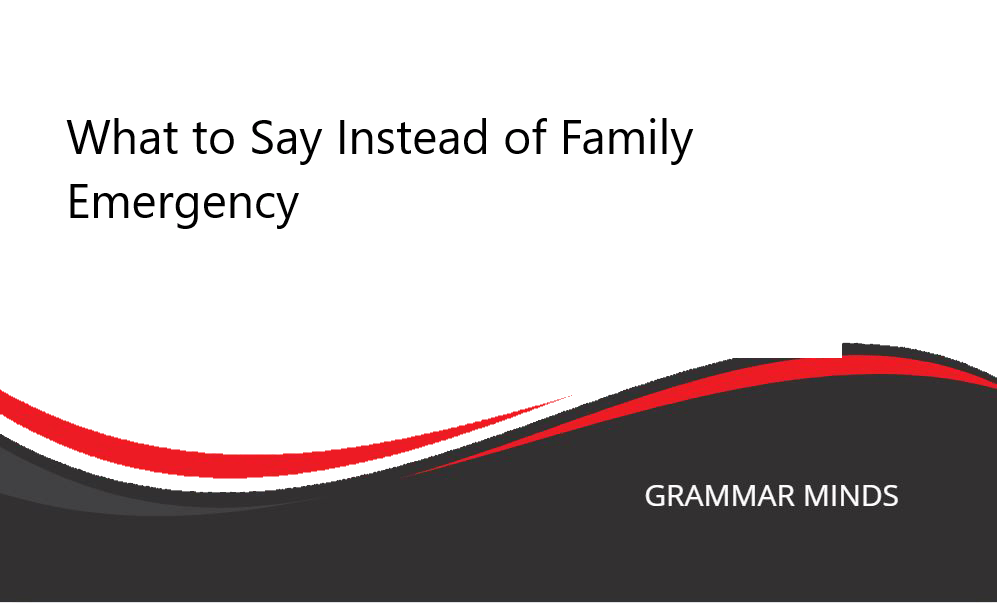Have you ever found yourself repeatedly using the phrase “family emergency” when you need to explain an unexpected absence or change of plans? Whether it’s in a professional setting or a personal situation, relying on the same expression over and over can feel monotonous and perhaps even raise suspicion in certain contexts.
Not only does the phrase “family emergency” sometimes feel overused, but it also leaves little room for subtlety or variation. You might want to be more specific, tactful, or even polite when informing someone about your situation without delving into too many personal details.
If you’re searching for alternative ways to express the idea of a family emergency, you’ve come to the right place! This article provides a comprehensive list of phrases you can use instead, whether you’re speaking in a formal or informal setting.
Do You Find Yourself Using the Phrase “Family Emergency” Repeatedly?
If the answer is yes, you’re not alone. “Family emergency” is a common, all-encompassing term that covers a wide range of scenarios, but it can feel repetitive or a bit vague after a while.
So, what can you say instead? Let’s explore a variety of alternatives that you can use to change up your vocabulary and add clarity to your communication.
Other Ways to Say “Family Emergency”
- Urgent Personal Matter
- Unexpected Personal Situation
- Pressing Family Concern
- Family Situation Requiring Immediate Attention
- Personal Issue Needing Immediate Resolution
- Critical Family Circumstance
- Pressing Domestic Matter
- Sudden Family Development
- Immediate Family Obligation
- Unforeseen Family Issue
Key Notes
“Family emergency” is grammatically correct and suitable for both formal and informal situations. However, it can sometimes feel a bit basic and overused. The alternatives provided can help you diversify your vocabulary based on context.
For instance:
- “Urgent Personal Matter” is great for formal settings, such as emails or business meetings.
- “Unexpected Personal Situation” works well in both formal and informal contexts.
- “Pressing Family Concern” can be used when you want to convey urgency without giving too much personal information.
- “Immediate Family Obligation” is a softer, more respectful way to communicate a family-related situation in professional settings.
Keep reading to discover how to use these phrases in different scenarios and real-life examples.
Urgent Personal Matter
Usage:
If you’re looking for a more formal and sophisticated alternative to “family emergency,” try using “urgent personal matter.” This phrase conveys seriousness without revealing too much about the nature of the issue. It’s perfect for professional emails or meetings where discretion is important.
Example (in an email):
Dear [Recipient],
Thank you for your assistance with the ongoing project. Unfortunately, I am dealing with an urgent personal matter and will need to step away for the remainder of the day. I will ensure that all deadlines are met upon my return.
Best regards,
[Your Name]
Unexpected Personal Situation
Usage:
A more informal alternative to “family emergency” is “unexpected personal situation.” This phrase works well when speaking to someone you are familiar with, such as a colleague or friend, and conveys that something has come up without sounding too vague.
Example (in conversation):
Hey [Friend’s Name],
Thanks for helping out earlier today. Unfortunately, an unexpected personal situation has come up, and I’ll need to head out. I’ll get back to you later!
Pressing Family Concern
Usage:
“Pressing family concern” is an excellent way to communicate a sense of urgency without delving into too much detail. This phrase is great for both formal and informal situations, particularly when you’re explaining your absence or delay.
Example (in an email):
Dear [Supervisor],
I apologize for the late notice, but a pressing family concern has arisen, and I will be unable to attend the meeting this afternoon. Please let me know if we can reschedule.
Thank you for your understanding.
Best regards,
[Your Name]
Family Situation Requiring Immediate Attention
Usage:
When you want to be more specific but still keep things professional, using “family situation requiring immediate attention” can be helpful. It gives the listener or reader a clear understanding that your issue is related to family, but it does not delve into unnecessary details.
Example (in a formal request):
Dear [Manager’s Name],
Unfortunately, I am dealing with a family situation requiring immediate attention, and I will need to take a personal day. I will make sure to complete any outstanding work as soon as possible.
Thank you for your support.
Best,
[Your Name]
Personal Issue Needing Immediate Resolution
Usage:
This alternative phrase strikes a balance between being professional and neutral, making it suitable for any setting. It helps emphasize the urgency of the situation without sounding too dramatic.
Example (in a casual text):
Hey [Friend’s Name],
I need to deal with a personal issue needing immediate resolution, so I’ll have to cancel tonight’s plans. We’ll reschedule soon!
Critical Family Circumstance
Usage:
For formal settings where you need to emphasize the importance of the situation, “critical family circumstance” is a polished and thoughtful way to explain a family emergency.
Example (in a formal message):
Dear [HR Contact],
I regret to inform you that due to a critical family circumstance, I will be unable to come into the office for the next few days. I will keep you updated as the situation progresses and will do my best to minimize any disruptions to the team.
Thank you for your understanding.
Sincerely,
[Your Name]
Pressing Domestic Matter
Usage:
If you’re looking for a more elegant and formal option, “pressing domestic matter” works well, especially in professional emails or conversations where you need to maintain a tone of professionalism.
Example (in an email):
Dear [Supervisor],
I am writing to inform you that I need to attend to a pressing domestic matter today. I will ensure that all pending work is completed once I return.
Best regards,
[Your Name]
Sudden Family Development
Usage:
For both formal and informal settings, “sudden family development” is a straightforward, respectful phrase to explain a situation without going into details. It implies that something has come up unexpectedly and requires your attention.
Example (in conversation):
Hey [Coworker’s Name],
I just found out about a sudden family development and will need to leave early today. Can you cover the rest of the meeting for me?
Immediate Family Obligation
Usage:
When discussing a family-related issue in a more formal tone, “immediate family obligation” is a considerate alternative. It shows responsibility and professionalism, especially when used in work-related communications.
Example (in a professional email):
Dear [Recipient],
Unfortunately, an immediate family obligation has come up, and I will be unavailable for the rest of the day. Please let me know if you need anything in the meantime, and I will get back to you as soon as possible.
Best regards,
[Your Name]
Unforeseen Family Issue
Usage:
This phrase is appropriate in situations where you want to highlight the unpredictability of the issue, but without diving into specifics. It works in both formal and informal contexts.
Example (in conversation):
Hey [Colleague’s Name],
I’m really sorry, but an unforeseen family issue has come up, and I need to head out. I’ll catch up with you tomorrow.
Is It Correct to Say “Family Emergency”?
Yes, “family emergency” is grammatically correct and widely understood in both formal and informal contexts. It is a versatile phrase that communicates urgency and the need to address a personal issue without requiring too much elaboration.
However, repeatedly using “family emergency” can sometimes feel bland or generic, particularly in professional communications. By exploring the alternatives provided in this article, you can enhance your communication and express yourself more clearly.
Here are a few slight variations you can also consider:
- Family matter
- Personal family emergency
- Time-sensitive family issue
Also Read:
10 Ways to Say “Have a Good Evening” and Diversify Your Conversations
In conclusion, “family emergency” is a grammatically correct and versatile phrase that can be used in various settings, from professional emails to casual conversations. However, using alternative phrases like “urgent personal matter” or “critical family circumstance” can help diversify your language and communicate more effectively.
Whether you’re writing an email to your boss or explaining an absence to a friend, choosing the right phrase will allow you to express yourself with greater clarity and subtlety.







